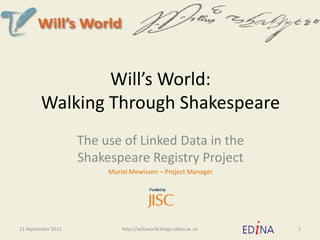
Will's World: Walking Through Shakespeare
- 1. Will’s World: Walking Through Shakespeare The use of Linked Data in the Shakespeare Registry Project Muriel Mewissen – Project Manager 21 September 2012 http://willsworld.blogs.edina.ac.uk 1
- 2. Outline • Shakespeare Registry background • British Museum SPARQL endpoint • Conclusion 21 September 2012 http://willsworld.blogs.edina.ac.uk 2
- 3. Background • JISC Discovery Programme 10 months projects – Dec 11 to Sep 12 • Aim: to improve discoverability and usability of online data through better access to better metadata • Demonstrate the benefits and principles of assembling metadata: ‘aggregation as a tactic’ • Focus on Shakespeare – Lots of data – Cultural Olympiad & Anniversary 23rd April • Glasgow culture hack event 21 September 2012 http://willsworld.blogs.edina.ac.uk 3
- 4. Shakespeare Registry Content Providers Users/Developers • Register online sources • Search, Identify, Locate online • Contribute metadata about resources using metadata resources aggregation Shakespeare Registry • Filters (Themes, Data types, Metadata, APIs, Source s,…) • Useful tools, license, documentation (build, use, register, contribut e…) 21 September 2012 http://willsworld.blogs.edina.ac.uk 4
- 5. Linked Data Fit Questions Users/Developers Who? What? Registry How? Attractive? Format? Self- sustainable, transferable Schema? License? Content How much? Sharing? Easy Rich, complex Access? Format? Wikipedia on Linked Data: “linked data describes a method of publishing structured data so that it can be interlinked and become more useful. It builds upon standard Web technologies such as HTTP and URIs, but rather than using them to serve web pages for human readers, it extends them to share information in a way that can be read automatically by computers. This enables data from different sources to be connected and queried… using standard formats such as RDF/XML…” Answer? 21 September 2012 http://willsworld.blogs.edina.ac.uk 5
- 6. Linked Data Provision • Over 40 sources of online resources – Royal Shakespeare Company, Shakespeare Birthplace Trust, Shakespeare’s Globe, Shakespeare Institute, Folger Shakespeare Library, Open Shakespeare, World Shakespeare Festival, Open Source Shakespeare, … – British Museum, British Library, Bodleain Library, Bristish Universities Film & Video Council, National Library of Scotland, Wellcome Images, British Library of Sounds, JISC MediaHUB, BBC, … – National Theatre Poster, Bosak’s Play of Shakespeare in XML, The work of the Bard, internet Shakespeare Editions, PlayShakespeare.com, Seanco Technology Shakespeare Quote Generator, ... • Many images, some XML, one SPARQL endpoint! British Museum: http://collection.britishmuseum.org/Sparql 21 September 2012 http://willsworld.blogs.edina.ac.uk 6
- 7. SPARQL Endpoint • Service endpoint • Web interface • Run SPARQL queries • Linked Data • Structured RDF stores 21 September 2012 http://willsworld.blogs.edina.ac.uk 7
- 8. Using the British Museum SPARQL Easy to start: • Sample query: document ontologies • Help: data structure, access & URIS • Documentation: Controlled terms, object names thesaurus Search for “Shakespeare”, “William Shakespeare” • Difficult to do keyword search • Difficult to do multi-stage search – Find the unique ID for an entity – Retrieve information related to the entity • Limited or no results • Overload the service 21 September 2012 http://willsworld.blogs.edina.ac.uk 8
- 9. SPARQL Common Issues Common issues: • Lack of documentation (ontologies, identifiers) • Lack example queries • Lack of identifiers • Slow, timeouts & result size limit • Inefficient queries (text & keyword search) 21 September 2012 http://willsworld.blogs.edina.ac.uk 9
- 10. SPARQL endpoint SPARQL is not • Relational DB (search on given value for field) – Simple SQL query can be complex • Text DB like Solr (flexible text search) – Not suited for discovery SPARQL provides links & context Think about Linked Data in the right way 21 September 2012 http://willsworld.blogs.edina.ac.uk 10
- 11. Asking the Right Questions • Structured data needs structured queries • To build meaningful queries, we need to know: – Data, structure, schema, identifiers • Internally specified How do we identify “William Shakespeare” and related objects before we can the retrieve the relevant Linked Data? • Need identifier for “William Shakespeare” • URI or ID in the British Museum schema 21 September 2012 http://willsworld.blogs.edina.ac.uk 11
- 12. Workflow for extracting metadata 1. Collection Database Search GUI 21 September 2012 http://willsworld.blogs.edina.ac.uk 12
- 13. Collection Database Search 2. Select object 4209 Results! 21 September 2012 http://willsworld.blogs.edina.ac.uk 13
- 14. 3. Extract the ID for the object 21 September 2012 http://willsworld.blogs.edina.ac.uk 14
- 15. 4. Use the ID in the SPARQL query 21 September 2012 http://willsworld.blogs.edina.ac.uk 15
- 16. 5. Extract the metadata Repeat for the remaining 4208 objects! 21 September 2012 http://willsworld.blogs.edina.ac.uk 16
- 17. Sustainable Workflow? Workaround • Multiple GUI searches on Shakespeare, William Shakespeare, Macbeth, Hamlet,…. • Manual steps • Many small queries, few large queries Feedback on blog post Person ID for “Shakespeare, William” 21 September 2012 http://willsworld.blogs.edina.ac.uk 17
- 18. Internal ID 21 September 2012 http://willsworld.blogs.edina.ac.uk 18
- 19. 400 triples 21 September 2012 http://willsworld.blogs.edina.ac.uk 19
- 20. Conclusions • SPARQL best suited to link data from different informational silos, not suited to text search and discovery • Common identifiers are essentials (i.e. ISSN) – Use of standards (ISNI), common language & ontologies • Documentation & example queries • Be prepared – To use additional data sources to identify URIs – To run many queries 21 September 2012 http://willsworld.blogs.edina.ac.uk 20
- 21. Thanks • British Museum – SPARQL is Beta version to generate feedback – New version available within a few months • Owen Stephens • EDINA Peter Burnhill, Jackie Clark, Catherine Fleming, Andrew Dorward, Neil Mayo, Nicola Osborne, Christine Rees, Tim Stickland 21 September 2012 http://willsworld.blogs.edina.ac.uk 21
